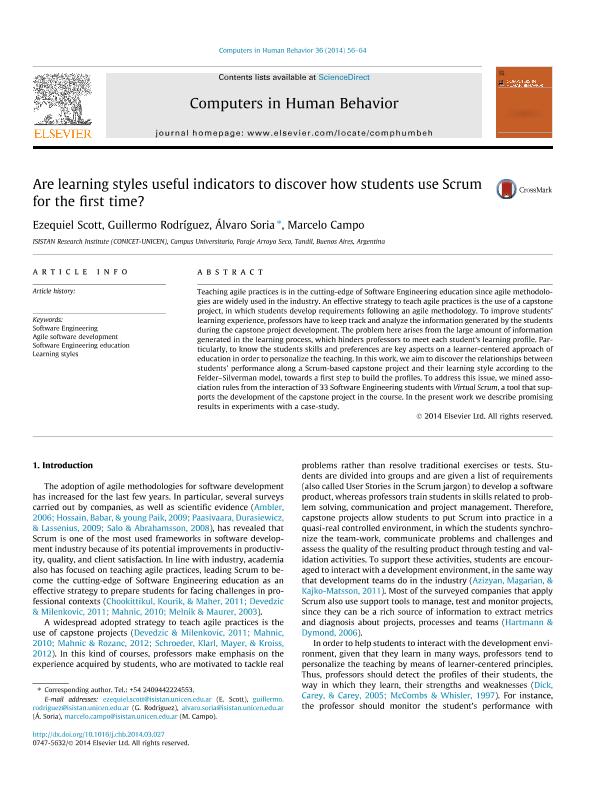Mostrar el registro sencillo del ítem
dc.contributor.author
Scott, Mario Ezequiel

dc.contributor.author
Rodríguez, Guillermo Horacio

dc.contributor.author
Soria, Alvaro

dc.contributor.author
Campo, Marcelo Ricardo

dc.date.available
2016-07-28T19:36:47Z
dc.date.issued
2014-07
dc.identifier.citation
Scott, Mario Ezequiel; Rodríguez, Guillermo Horacio; Soria, Alvaro; Campo, Marcelo Ricardo; Are Learning Styles Useful Indicators to Discover How Students Use Scrum for the First Time?; Elsevier; Computers in Human Behavior; 36; 7-2014; 56-64
dc.identifier.issn
0747-5632
dc.identifier.uri
http://hdl.handle.net/11336/6777
dc.description.abstract
Teaching agile practices is in the cutting-edge of Software Engineering education since agile methodologies are widely used in the industry. An effective strategy to teach agile practices is the use of a capstone project, in which students develop requirements following an agile methodology. To improve students? learning experience, professors have to keep track and analyze the information generated by the students during the capstone project development. The problem here arises from the large amount of information generated in the learning process, which hinders professors to meet each student?s learning profile. Particularly, to know the students skills and preferences are key aspects on a learner-centered approach of education in order to personalize the teaching. In this work, we aim to discover the relationships between students? performance along a Scrum-based capstone project and their learning style according to the Felder?Silverman model, towards a first step to build the profiles. To address this issue, we mined association rules from the interaction of 33 Software Engineering students with Virtual Scrum, a tool that supports the development of the capstone project in the course. In the present work we describe promising results in experiments with a case-study.
dc.format
application/pdf
dc.language.iso
eng
dc.publisher
Elsevier

dc.rights
info:eu-repo/semantics/openAccess
dc.rights.uri
https://creativecommons.org/licenses/by-nc-nd/2.5/ar/
dc.subject
Software Engineering
dc.subject
Agile Software Developmen
dc.subject
Software Engineering Education
dc.subject
Learning Styles
dc.subject.classification
Ciencias de la Computación

dc.subject.classification
Ciencias de la Computación e Información

dc.subject.classification
CIENCIAS NATURALES Y EXACTAS

dc.title
Are Learning Styles Useful Indicators to Discover How Students Use Scrum for the First Time?
dc.type
info:eu-repo/semantics/article
dc.type
info:ar-repo/semantics/artículo
dc.type
info:eu-repo/semantics/publishedVersion
dc.date.updated
2016-07-28T18:33:03Z
dc.journal.volume
36
dc.journal.pagination
56-64
dc.journal.pais
Países Bajos

dc.journal.ciudad
Amsterdam
dc.description.fil
Fil: Scott, Mario Ezequiel. Consejo Nacional de Investigaciones Científicas y Técnicas. Centro Científico Tecnológico Tandil. Instituto Superior de Ingenieria del Software; Argentina
dc.description.fil
Fil: Rodríguez, Guillermo Horacio. Consejo Nacional de Investigaciones Científicas y Técnicas. Centro Científico Tecnológico Tandil. Instituto Superior de Ingenieria del Software; Argentina
dc.description.fil
Fil: Soria, Alvaro. Consejo Nacional de Investigaciones Científicas y Técnicas. Centro Científico Tecnológico Tandil. Instituto Superior de Ingenieria del Software; Argentina
dc.description.fil
Fil: Campo, Marcelo Ricardo. Consejo Nacional de Investigaciones Científicas y Técnicas. Centro Científico Tecnológico Tandil. Instituto Superior de Ingenieria del Software; Argentina
dc.journal.title
Computers in Human Behavior
dc.relation.alternativeid
info:eu-repo/semantics/altIdentifier/url/http://www.sciencedirect.com/science/article/pii/S0747563214001496
dc.relation.alternativeid
info:eu-repo/semantics/altIdentifier/doi/http://dx.doi.org/10.1016/j.chb.2014.03.027
dc.relation.alternativeid
info:eu-repo/semantics/altIdentifier/doi/10.1016/j.chb.2014.03.027
Archivos asociados
